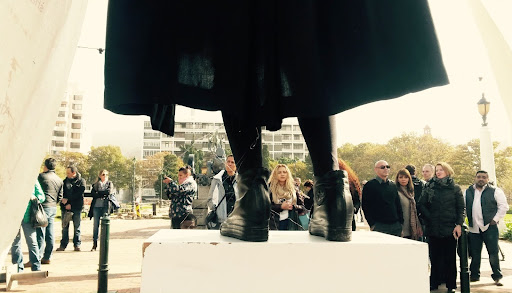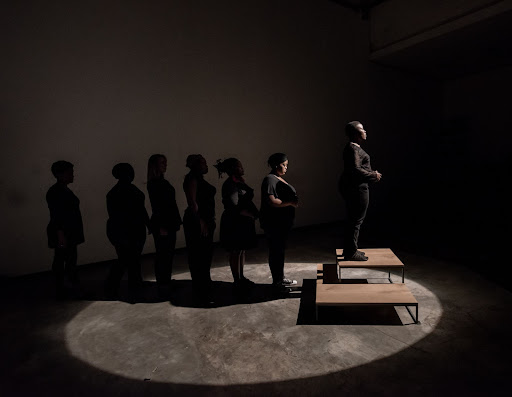Women in Khayelitsha watch a performance by Buhlebezwe Siwani, which began Any Given Sunday. (Photo: Riason Naidoo)
Cited as the impetus for Any Given Sunday, the student protests that started in October 2015 across South Africa (#FeesMustFall), find historical space within an important genealogy of student activism emerging from a long history of such direct action.
In contrast, Riason Naidoo’s public curatorial intervention is a critical call for a new kind of art and activism to take to the streets, or perhaps more precisely, to be and become in the everydayness of the street. He draws attention to issues around class, demonstrating the inextricable link of capitalism to colonialism.
Naidoo enables the artists and performers to evoke, provoke, and inspire a different way of thinking about what we all do in the everyday: how politics are imbued in our ways of becoming in the quotidian. In that sense, Naidoo brilliantly calls into question the foundations of neocolonial (read as capitalist/white/hetero/patriarchal) museum conditions in Cape Town.
Although not contextualised as such, this shift to find art in/with/within the public, in this place and at this time, becomes a radical and political move out of the colonial whitewashed structures of museum curatorial practice and in a very real way, becomes a decolonial gesture.
A series of artistic interventions, songs, music, movements and events, among other strategies, encountered the everyday life of a cityscape still reeling from racial, ethnic and economic segregation. For each artist and artist collective working in this space, the recognition of a heteropatriarchal colonial infrastructure that had maintained itself continued to be at the centre of their practice.
Embedded within that same critique is also one of authorised spaces of art; by moving the location of the performance into the quotidian, the resistance to neocolonialism becomes embedded in public life and each artist makes visible the consciousness of those not willing to be whitewashed by the authorised discourses of art or the sovereign.
 Sethembile Msezane performed The Charter at the Company’s Garden. (Photo: Riason Naidoo)
Sethembile Msezane performed The Charter at the Company’s Garden. (Photo: Riason Naidoo)
The body as testimony, witness, and memorial
We see them at the train stations, meat markets, the Company’s Garden and in the church: these women carry the weight of our gaze and yet are usually rendered unseen or unheard. The visual artists Gabrielle Goliath, Sethembile Msezane, Zanele Muholi and Buhlebezwe Siwani reject this invisibility and silence.
They are not interested in our possible gaze: they demand we look, hear and think about what sorts of places society places them in; they look back, challenging us to look away, forcing us to contend with the politics of their bodies. Through iconic, sonic and visceral engagement, these artists engage and create discursive publics in public through their artistic, conceptual and corporeal form.
Any Given Sunday began with an intimately public performance by Siwani that centred and held at its core, purity, spiritual power, particularly in relation to ubungoma, which ontologically holds divinity and its power in place, contending with liminality both as conceptual form and reality.
There is a strength and stability that is readily apparent in the stillness of Siwani’s body as she sits with four bowls containing water, a bar of soap, cow dung and holy ash, respectively. This is the body of a sangoma, and she sits in the liminality of what is the transit space and a meat market, Khayelitsha, between the rural and urban.
Her stance invites this particular public to either throw, wipe or wash her body using what is present in the enamel bowls at her feet. Through a performance in which the artist/sangoma uses her own body, Siwani forces us to contend with the paradox of divinity in the everyday, simultaneously allowing those bodies in liminal spaces of transit and corporeality the capacity to engage in acts or prayers of belonging in a body that otherwise is “othered” in the city.
At another such space of transit, the Cape Town Station, Zanele Muholi presents reimagined self-portraits from the Somnyama Ngonyama series plastered on the walls. This public intervention was bookended by two public talks — one for the larger community, and the second for matric learners at Silikamva High School, Hout Bay.
Transforming the visual landscape, publics moving through the station interact with the striking images, caressing them, and taking images of themselves with the images of the series as a backdrop. Queering public space through the subject matter of the re-presented body; a body outside the racial and sexual mainstream, Muholi transforms the visual codes of bodies and beauty.
Through the accentuated black queerness against the contrast of white sheets or the white of the eyes, Muholi presents an important intervention that acts as witness and testimony to the queer black bodies in the in between places in spaces of transit, that amplify performance, survival, and activism.
 Gabrielle Goliath staged Elegy at the Langa Methodist Church. (Photo by Stella Tate of the 2018 performance at the Centre for the Less Good Idea)
Gabrielle Goliath staged Elegy at the Langa Methodist Church. (Photo by Stella Tate of the 2018 performance at the Centre for the Less Good Idea)
Elegy, performed in the Langa Methodist Church, Cape Town, is a haunting sound performance that enacts ritual mourning. Directly following the Sunday church service, Gabrielle Goliath and seven female vocalists publically mourn the rape and strangling of Ipeleng Christine Moholane, a young woman who was an active member of the Seventh Day Adventist Church.
In bringing her unjust death back to the space of the church, Goliath’s performance simultaneously brings all the churchgoers in as witness to Ipeleng’s violent, untimely and gruesome death. The tenor, pitch and range of the vocalists’ laments, replicating Ipeleng’s father’s letter about his daughter and her death to Goliath, testify to the depth of solemnity of that moment, honouring a life taken, while affectively bringing everyone to a place where they must take stock of gendered and sexualised violence.
Given these conditions of violence, memorials of women tend to be overlooked, silenced or forgotten. This is precisely what artist Sethembile Msezane set out to challenge. Standing atop a plinth with her arms continuously outstretched on a long wooden pole extending to either side of her body, and canvases with the Freedom Charter flowing down from the pole supported behind her neck, Msezane stood in the Company’s Garden as people walked by, stopping, looking, lingering and watching.
Her body stood in the garden, a space in which what seems to be memorialised is white patriarchy; her body stood as a memorial to all the “promises” of a new South Africa, and the continued erasure of black women’s bodies in the narratives of state memory. In her enduring stance, she exemplified the role of women in attaining freedom, and the betrayal of history in refusing to memorialise those same bodies.
Whereas these artists used bodies to directly and unabashedly confront gendered violence in South Africa, other artists in Any Given Sunday indexed structural violence and brought attention to the everyday forms of resistance that used play, music and performance in the quotidian.
Uzma Z Rizvi is associate professor of anthropology and urban studies at Pratt Institute, Brooklyn, New York and visiting faculty in the department of archaeology, Shah Abdul Latif University, Khairpur, Pakistan. She has amassed nearly two decades of work on decolonising methodologies, intersectional and feminist strategies, and transdisciplinary approaches.
This is an edited excerpt from the full article published in the special 24-page feature on Any Given Sunday: A Socially Engaged Public Art Project — available on the Mail & Guardian website, in print format in the Western Cape this Friday, 21 January 2022, and at the Rupert Museum in Stellenbosch — that looks back on, illuminates and analyses the art project that took place in the Mother City five years ago. This unconventional exhibition catalogue includes a series of insightful essays by Jay Pather, Richard Pithouse, Anthony Bogues, Thuli Gamedze, Uzma Rizvi and Riason Naidoo — with exclusive interviews and profiles on each of the artists’ interventions — making Any Given Sunday a must-read for all those interested in art, culture and politics